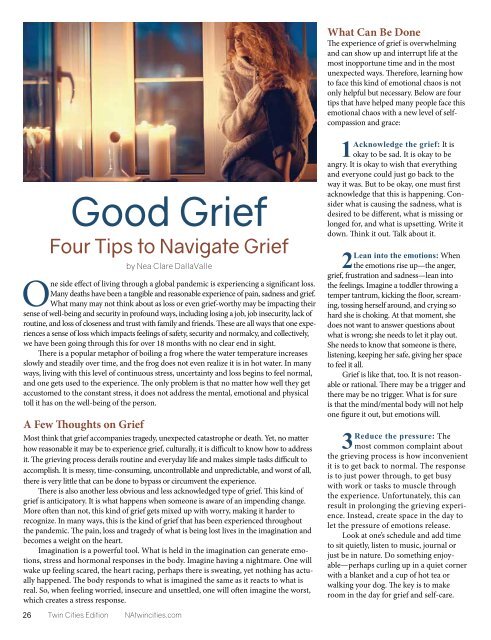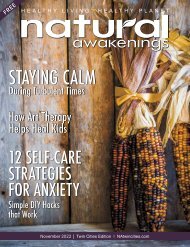Natural Awakenings Twin Cities October 2021
Read the October 2021 edition of Natural Awakenings Twin Cities magazine. This is our annual Healthy Planet Issue which is focused on Living a Simpler Lifestyle and Breast Health. Topics also include the fall fruit recipes, water scarcity, tips on grieving, talking with your children about climate change, cannabis for your pets and so much more! Be sure to check out our local content including News Briefs announcements, Community Resource Guide with providers throughout the metro who can meet your individual wellness needs, and all the happenings in the Calendar of Events. There is additional online-only content that can be found at NATwinCities.com. While you are there, be sure to sign up for our Newsletter and Digital Magazine and continue your reading with our archived articles from local experts.
Read the October 2021 edition of Natural Awakenings Twin Cities magazine. This is our annual Healthy Planet Issue which is focused on Living a Simpler Lifestyle and Breast Health. Topics also include the fall fruit recipes, water scarcity, tips on grieving, talking with your children about climate change, cannabis for your pets and so much more!
Be sure to check out our local content including News Briefs announcements, Community Resource Guide with providers throughout the metro who can meet your individual wellness needs, and all the happenings in the Calendar of Events. There is additional online-only content that can be found at NATwinCities.com.
While you are there, be sure to sign up for our Newsletter and Digital Magazine and continue your reading with our archived articles from local experts.
Create successful ePaper yourself
Turn your PDF publications into a flip-book with our unique Google optimized e-Paper software.
Good Grief<br />
Four Tips to Navigate Grief<br />
by Nea Clare DallaValle<br />
One side effect of living through a global pandemic is experiencing a significant loss.<br />
Many deaths have been a tangible and reasonable experience of pain, sadness and grief.<br />
What many may not think about as loss or even grief-worthy may be impacting their<br />
sense of well-being and security in profound ways, including losing a job, job insecurity, lack of<br />
routine, and loss of closeness and trust with family and friends. These are all ways that one experiences<br />
a sense of loss which impacts feelings of safety, security and normalcy, and collectively,<br />
we have been going through this for over 18 months with no clear end in sight.<br />
There is a popular metaphor of boiling a frog where the water temperature increases<br />
slowly and steadily over time, and the frog does not even realize it is in hot water. In many<br />
ways, living with this level of continuous stress, uncertainty and loss begins to feel normal,<br />
and one gets used to the experience. The only problem is that no matter how well they get<br />
accustomed to the constant stress, it does not address the mental, emotional and physical<br />
toll it has on the well-being of the person.<br />
A Few Thoughts on Grief<br />
Most think that grief accompanies tragedy, unexpected catastrophe or death. Yet, no matter<br />
how reasonable it may be to experience grief, culturally, it is difficult to know how to address<br />
it. The grieving process derails routine and everyday life and makes simple tasks difficult to<br />
accomplish. It is messy, time-consuming, uncontrollable and unpredictable, and worst of all,<br />
there is very little that can be done to bypass or circumvent the experience.<br />
There is also another less obvious and less acknowledged type of grief. This kind of<br />
grief is anticipatory. It is what happens when someone is aware of an impending change.<br />
More often than not, this kind of grief gets mixed up with worry, making it harder to<br />
recognize. In many ways, this is the kind of grief that has been experienced throughout<br />
the pandemic. The pain, loss and tragedy of what is being lost lives in the imagination and<br />
becomes a weight on the heart.<br />
Imagination is a powerful tool. What is held in the imagination can generate emotions,<br />
stress and hormonal responses in the body. Imagine having a nightmare. One will<br />
wake up feeling scared, the heart racing, perhaps there is sweating, yet nothing has actually<br />
happened. The body responds to what is imagined the same as it reacts to what is<br />
real. So, when feeling worried, insecure and unsettled, one will often imagine the worst,<br />
which creates a stress response.<br />
26 <strong>Twin</strong> <strong>Cities</strong> Edition NAtwincities.com<br />
What Can Be Done<br />
The experience of grief is overwhelming<br />
and can show up and interrupt life at the<br />
most inopportune time and in the most<br />
unexpected ways. Therefore, learning how<br />
to face this kind of emotional chaos is not<br />
only helpful but necessary. Below are four<br />
tips that have helped many people face this<br />
emotional chaos with a new level of selfcompassion<br />
and grace:<br />
1Acknowledge the grief: It is<br />
okay to be sad. It is okay to be<br />
angry. It is okay to wish that everything<br />
and everyone could just go back to the<br />
way it was. But to be okay, one must first<br />
acknowledge that this is happening. Consider<br />
what is causing the sadness, what is<br />
desired to be different, what is missing or<br />
longed for, and what is upsetting. Write it<br />
down. Think it out. Talk about it.<br />
2Lean into the emotions: When<br />
the emotions rise up—the anger,<br />
grief, frustration and sadness—lean into<br />
the feelings. Imagine a toddler throwing a<br />
temper tantrum, kicking the floor, screaming,<br />
tossing herself around, and crying so<br />
hard she is choking. At that moment, she<br />
does not want to answer questions about<br />
what is wrong; she needs to let it play out.<br />
She needs to know that someone is there,<br />
listening, keeping her safe, giving her space<br />
to feel it all.<br />
Grief is like that, too. It is not reasonable<br />
or rational. There may be a trigger and<br />
there may be no trigger. What is for sure<br />
is that the mind/mental body will not help<br />
one figure it out, but emotions will.<br />
3<br />
Reduce the pressure: The<br />
most common complaint about<br />
the grieving process is how inconvenient<br />
it is to get back to normal. The response<br />
is to just power through, to get busy<br />
with work or tasks to muscle through<br />
the experience. Unfortunately, this can<br />
result in prolonging the grieving experience.<br />
Instead, create space in the day to<br />
let the pressure of emotions release.<br />
Look at one’s schedule and add time<br />
to sit quietly, listen to music, journal or<br />
just be in nature. Do something enjoyable—perhaps<br />
curling up in a quiet corner<br />
with a blanket and a cup of hot tea or<br />
walking your dog. The key is to make<br />
room in the day for grief and self-care.

















